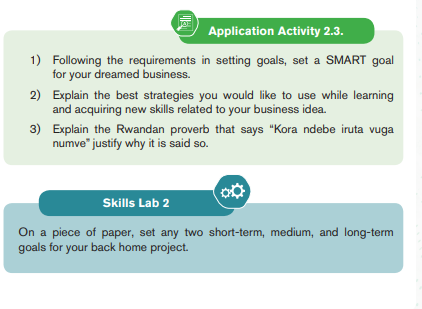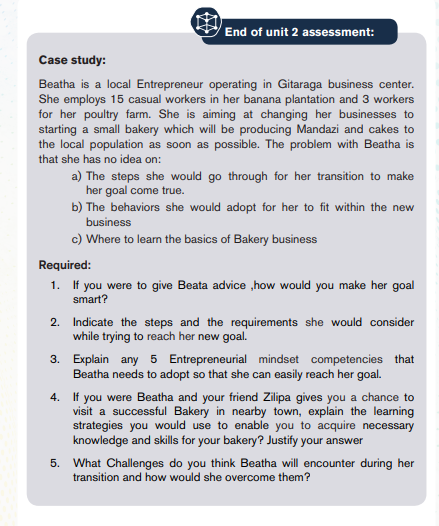UNIT 2: SETTING PERSONAL GOALS
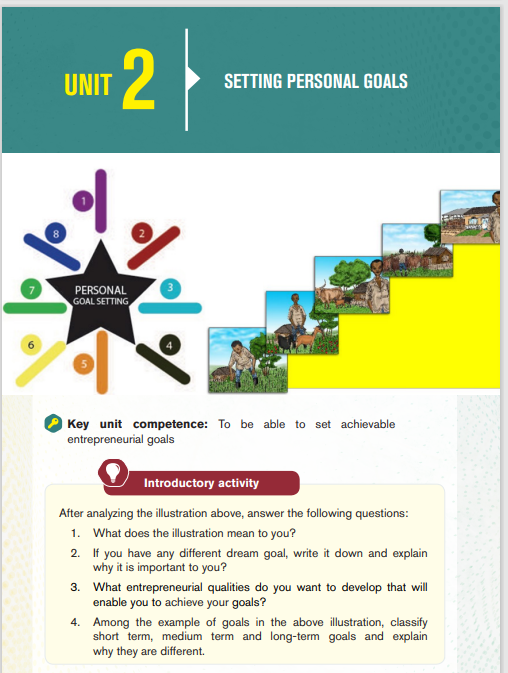
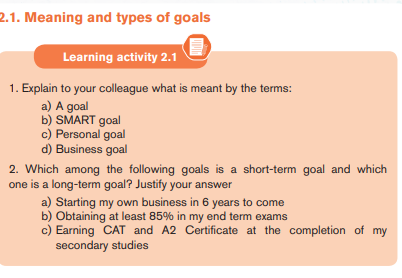
2.1.1. Meaning of a Goal, Personal Goal and Goal setting
A Goal is an aim or an objective that you work towards, with effort and determination. It can also mean a result towards which the effort is directed. As an accountant in special or an individual in general it is very important to have and pursue a specific objective (goal) of what you will achieve or do after a specific period for the success in your life.
Personal goal: This is an objective that someone sets for a specific reason within a specific timeframe. When someone’s goal relates to business activities, it is called “Business Goal.

As future Professional Accountants, it is imperative that each student finishes senior four having a very clear and SMART personal goal of which teachers will provide coaching and continuous guidance. This helps effective goal implementation and generally success in life.
Goal Setting: This term refers to the activity or a process of setting one’s goal. Setting goals is more than deciding what you want to do. It involves figuring out what you need to do, to get where you want to go, and how long it will take you to get there. The first step to success is knowing where you want to go. The second step is having a plan to get there. Your goals are your roadmap, follow them and you will be on your way to success.
2.1.2. Characteristics of a SMART goal
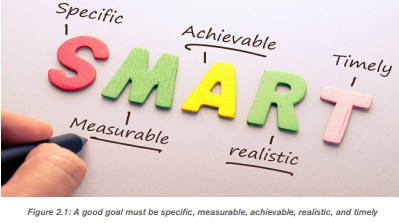
Sometimes a goal seems like it is just a dream. You may wish to do something one day that never seems to happen but it takes courage, patience, and hard work to get where we desire to be. SMART is an acronym that stands for Specific, Measurable, Achievable or Attainable, Realistic, and Timely. Therefore, a SMART goal incorporates all of these criteria to help focus your efforts and increase the chances of achieving your goal.
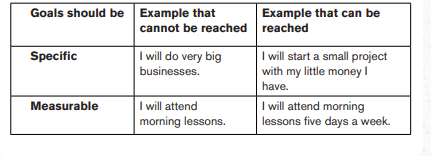
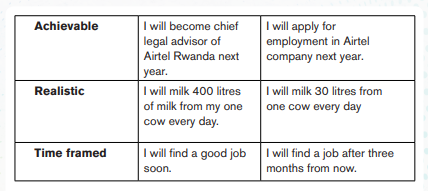
SMART is a useful tool for setting goals that you can reach. When we set a SMART goal, we can direct our actions into achieving the goal. Therefore, a good goal should be characterized by Specific, measurable, attainable, realistic, time bound aspects.
2.1.3. Types of Goals
Many people set goals to be achieved within various time frames due to different reasons. When a goal is to be achieved in a period less than One year, then it is known as a “Short-term goal”, When a goal is to be achieved in a period between two to five years, then it is known as a “Medium
- term goal” while a goal is to be achieved in more than five years then it is known as “Long-term goal”
2.1.4. Setting long and short
-term goals In setting long, medium term and short
- term goals; One should first respond to the following questions:
– Where do I want to be in the next period?
– What must I know to get there?
– What abilities and experience do I already have that are going to help me take these steps?
– What obstacles might be on my way and how can l deal with them?
– What should I do first, second, third, fourth and so on?
– Do I have necessary resources to use while working on my goal?
– What opportunities are already in place to help me reach my goal?
– What strategies should I employ?
Determination of what one needs to achieve in future, setting priorities, defining the Start and Ending point, identifying possible challenges and opportunities are the keys for someone to confidently achieve his/ her goal
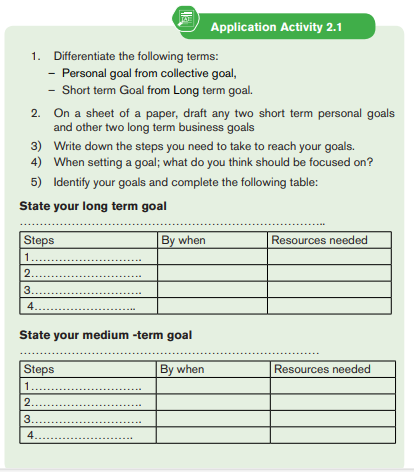
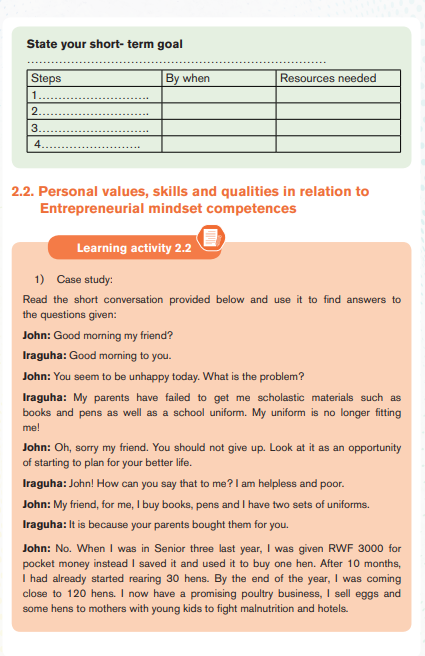
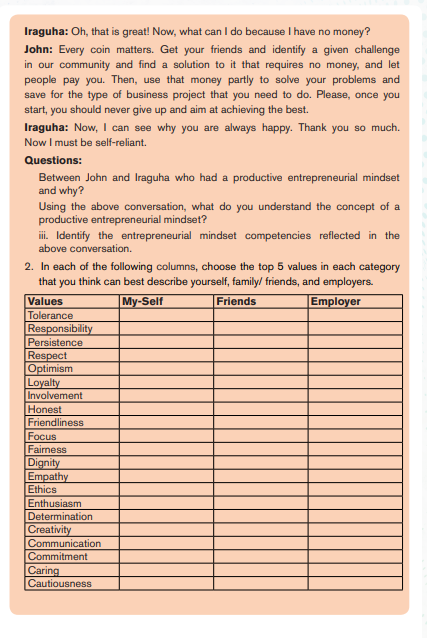
2.2.1. Importance of personal qualities, talents and entrepreneurial mindset
Knowing your qualities, values and skills, will help you work towards achieving your goals. Values are internal. Values are a means of perfection of personality. “We need Values to Become... We need Skills to Do...” Mindset is a set of opinions and the way an individual thinks.
It can also refer to a person’s usual attitude or mental state and reactions towards a given situation. Mindsets influence an individual’s response to a situation.
E.g.: People may react differently to similar situations due to the nature of the mindset they have. An entrepreneurial mindset is a set of skills that equips an individual with the ability to identify and make better use of challenges, find solutions to the setbacks, and succeed in varying settings.
Personal qualities are inner feelings. E.g.: Kind, Helpful, Caring, Understanding, Patient, You can see people doing good things but deep inside, they may be filled with anger, hate, They may just be showing off. We all have different values and interests. Some people may not know their values well.
This topic will help you discover your values. It is always advisable for one to communicate their values and interests to friends, family members, fellow employees and to employers. Many values are similar, but employers might put more emphasis on values that will help them get their businesses ahead.
Therefore, it is important to be aware of the values you have and those that your employers want so that you can try to behave in a way that reflects those values.
You should also identify your talents early, nurture them and develop them since whatever surrounds you, embeds an opportunity that can make you successful in life as an entrepreneur. Always look at whatever your community is experiencing with an entrepreneurial attitude or ‘eye’. This is the power of the entrepreneurial productive mindset.
2.2.2. Entrepreneurship mindset competencies:
Entrepreneurial mindset competencies refer to a combination of mental abilities, attitudes, values, and knowledge that any entrepreneur must have on top of other factors to succeed in the business world. Here are some of the Values and qualities related to Entrepreneurial mindset that everyone should strive to develop for his/her personal and Entrepreneurial development:
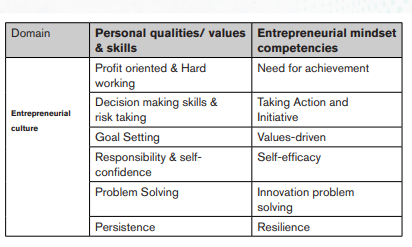
• Need for achievement: Preference for the challenge, acceptance of personal responsibility, or a personal drive for accomplishment. Setting and working towards future goals and targets helps you to achieve success. This brings you recognition and boosts your confidence. When you work hard and put in a lot of effort to accomplish something difficult
- the rewards are high. This is a valuable skill that can be continuously developed throughout your life and will be helpful in all situations.
• Taking action & initiative: The ability to turn ideas into action through creativity, innovation, and risk-taking, as well as the ability to plan and manage the project. Taking Action and initiative is all about having a plan and making it happen. With the world facing many challenges, people have to implement plans that will make a difference.
• Values-driven: A deep sense of purpose and commitment to life-affirming values, such as honesty, integrity, excellence, courage, humility, trust, care for people, and social/environmental responsibility.
• Self-efficacy: This is self-confidence in one’s ability to accomplish and succeed in organizational tasks or business operations.
An important part of self-efficacy is learning to identify your own strengths and weaknesses, and then being able to improve them.
• Innovation problem solving: Generating innovative ideas to solve the problem, although there is no one right away to solve any particular problem
• Resilience: The capacity to recover quickly from difficulties and carry on when faced with failures/difficulties. When there is a challenge, there is an opportunity. Resilient people don’t fear challenges but use them to learn and improve. Farmers are well-known for their resilience to all the factors that influence their success.

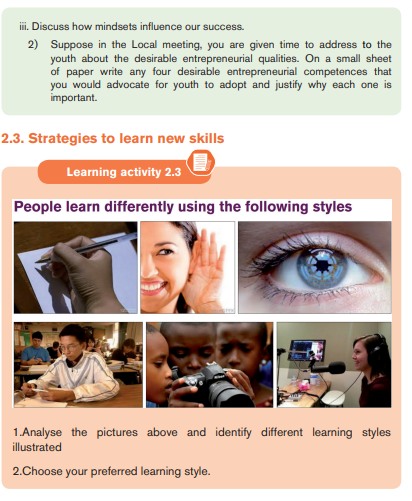
2.3.1. Learning styles
After setting one’s goal, it becomes very important for someone to start developing a productive entrepreneurial mindset and start to learn about the new goal. Using your best learning strategies will enable you to acquire basic skills for that goal. However, it is very crucial to note that people learn differently, using different learning styles like gestures, observing, Writing, Reading, Hearing, Speaking…
Most of the time, you will combine different learning styles to be able to comprehend or do something new.
2.3.2. Guidelines for different learning styles
The following are guidelines for different learning styles:
If you learn best by speaking do the following:
• Choose an activity that requires a lot of talking
• Ask questions if you have not understood or you need clarifications
• Repeat things right after you hear them so as to better remember them
• Study with other people in order to share new information through talking.
If you learn best by listening do the following:
• Choose an activity that requires a lot of listening
• Call people on phone instead of writing to them
• Study with others to share views via talking
• Ask people to explain things you don’t understand
• Read aloud information you need to study
If you learn best by reading do the following:
• Choose an activity that requires a lot of reading
• Get information through written words
• Have people write down directions for you to read
• Read instructions instead of being told or shown
• Take good notes and then read them later on
If you learn best by writing do the following:
• Choose an activity that requires a lot of writing
• Writ down the things you need to do and keep a written schedule
• Take notes when listening to instructions
• When you are reading underline important point and take notes as you read along
If you learn best by seeing/observing do the following:
• Choose an activity that requires a lot of observation
• Use charts, graphs, pictures, etc.…
• Visualize words, pictures, telephone numbers, etc.…in your mind
• Take notes of shapes, and colors of things that you need to remember
• As you read something imagine how it would look like if it is happening in real life
• Watch others do things you need to know how they are done
If you learn best by doing do the following:
• Choose an activity that lets you work with hands and move around
• Visit places so as to see how things are actually done
• When you want to learn how to do something new, watch someone doing it and ask him/her to show you how it is done
• If given a chance, show others how things are done by doing it in front of them
